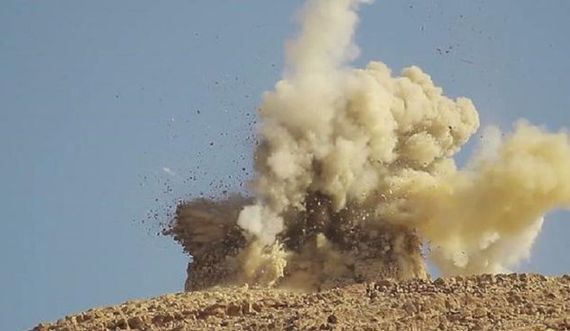ISIS has developed a new tool of warfare that is being deployed in its deadly strategy for the creation of an Islamic Caliphate: destruction and trafficking of culture.
It is a tool that lands them on the front page of global newspapers and in social media, strikes at the economy of its victims, intimidates the local population and eradicates the past -- all while bringing in millions of dollars to fund their deadly cause.
Not since the looting by the Nazis have the world seen a more calculated and widespread use of antiquities looting and destruction to do harm.
Certainly, looting has been occurring since there was buried treasure. But ISIS and its sympathizers have taken it to a new level. They are intentionally targeting the symbols that define our culture as a means to destroy our spirit.
Illicit antiquities are one of the top sources of funding for ISIS -- along with oil and kidnapping.
There is a definite pattern emerging.
ISIS has targeted the spirit of French culture: food, sports and music. Fearful of the potential economic impact, France has launched a fund to support culture in wake of the attacks. Cultural Minister Ms. Pellerin announced, "Culture is our greatest shield, and our artists are our best weapon," in the fight against terror.
In Egypt, a bomb was disarmed at the Great Pyramids in October. This summer, a suicide bomber was captured before entering the Temple of Karnak in Luxor. The bombing of a plane coming from the beach resort of Sharm el-Sheikh halted one of the largest sources of economic revenues -- Russian tourists.
In Tunisia, ISIS targeted the Bardo Museum -- killing 20 foreign tourists and injuring many more. Tourism, a top source of revenue source for the country, has declined precipitously.
In Mali, Yemen, and Libya, historic libraries have been raided, artifacts pillaged, and ancient structures razed: all are targets of ISIS and its partners.
And nowhere has culture been a greater victim than in Syria and Iraq. The list of destruction is a long one. Palmyra, Mosul, Nineveh and hundreds others -- names famous from our studies of the Cradle of Civilization -- have all been attacked.
Many ask if we need to make a choice between saving lives or saving stones. The director of National Museum of Iraq answered this question eloquently when he explained: "Yes, they're just statues. But for us, they're living things. We came from them; we are part of them. That is our culture and our belief."
These attacks are so much more than the destruction of stones. It is the eradication of a shared history. It is the elimination of economic opportunity. It is use of our culture to fund their terrorist activities. It is a strike at freedom of expression and religion.
So then what can be done? There is actually a lot that we can do - as individuals and institutions.
➢Don't buy conflict antiquities
➢Shut off the U.S. as a market for one of the top sources of ISIS funding The U.S. government can negotiate cultural agreements with the countries in conflict as well as major transshipment countries.
➢Use of Military Force: We are a long way from boots on the ground to save antiquities, but targeted military air strikes, as part of an existing mission against ISIS, would be a deterrent.
➢Capacity Building in Conflict Countries: Training for border police and customs agents to recognize antiquities, as well as creating digital records of what has been excavated to track looted items.
➢Create Economic Opportunity: Provide jobs and opportunities related to historic sites through incentive programs for the local population to create a vested local interest in protecting the sites and artifacts.
➢Raise Awareness: Raise global awareness that purchasing conflict antiquities could be funding terrorism.
➢Launch a Heritage Protection Fund: Managed by the United Nations with public and private funds which countries in conflict can draw upon for site security and other necessary protective measures.
We have a collective responsibility to save lives and to protect our shared heritage. And in doing so, it is a contribution, even in some small way, to preventing these terrorists from threatening our universal rights to express ourselves through our religion, our free speech, and our artistic works.

